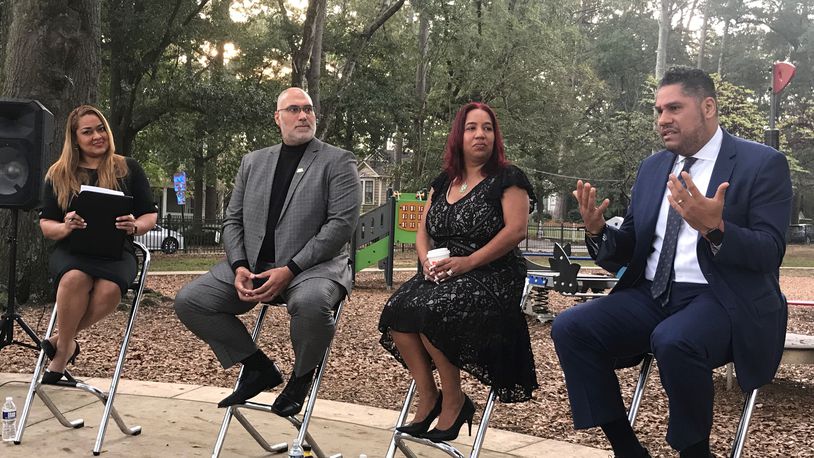‘There’s diversity within the Black diaspora:’ Afro Latinos in Atlanta speak up

By Lautaro Grinspan, The Atlanta Journal-Constitution
Leaders discuss challenges, and plans to build bridges between Hispanic and Black communities
Afro Latino community leaders in Atlanta gathered on Thursday to talk about their lived experiences in the South – including the prejudice they face in both the Hispanic and Black communities.
The panel discussion, which sought to boost Afro Latino visibility on the tail end of Hispanic Heritage Month, was held at Westside’s Sara J. González Memorial Park, Georgia’s first public park to be named after a Hispanic individual (González was a Cuban immigrant and an advocate for Latino and minority rights in Atlanta). Organizers included 100 Black Men of Atlanta and HYPE, Hispanic Young Professionals and Entrepreneurs, among others.
Jason Esteves, Atlanta school board chair and the first Latino elected to a school board of education in Georgia, was two years old when his family moved from Puerto Rico to Macon. In opening remarks, he said his childhood was “a journey of confusion.”
“I just didn’t understand. Was I Black? Was I Hispanic? What was I? It wasn’t until [college in Miami] that I met people like me, who could be Black and Latino and who could be comfortable in their skin.”
Roughly a quarter of all U.S. Hispanics consider themselves Afro Latino, Afro-Caribbean or of African descent, according to a Pew Research Center study. In Latin America, one of every four people identifies as afro-descendant, per a World Bank report.
‘There’s diversity within the Black diaspora’
Louis Enrique Negrón has served since February as executive director of 100 Black Men of Atlanta. An Afro Latino of Puerto Rican descent, Negrón grew up in a predominantly African American neighborhood in Oakland, California. He says his “dialect and cadence is that of a brother.” But he didn’t feel fully embraced by the Black community in Atlanta when he enrolled in Morehouse College in the 1990s, in part because his Hispanic background didn’t square neatly with the Southern racial binary prevalent at the time.
“I come here and it’s ‘You’re either Black or you’re white,’” he said.
Decades later, Negrón says his recent posting at the head of 100 Black Men of Atlanta was met with “online [rhetoric] talking about ‘How you get this job when you ain’t Black?’”
“I think some people just want me to choose. Either you’ll be a Black man or a Latino man. Which one do you want to be? And it frustrates me because I am both. I’m blessed to be within both worlds.”
Joel Alvarado is an Atlanta-based executive at Ohio River South, a strategy firm. Like Negrón, Alvarado is also Afro Latino with Puerto Rican roots, as well a Morehouse graduate.
“It was a solitary journey for a long time to try to explain to people that there are Latinos who are Black. I’m not saying I’m African American, that’s a totally different group, but I am a Black man, I define myself as such. And it took a long time to be able to help people understand that there’s diversity within the Black universe, within the Black diaspora.”
Although exact figures are difficult to determine, it is estimated that only a very small percentage of the 10.7 million enslaved Africans who survived the sea trip ended up in North America. The overwhelming majority was sent to Latin America.
‘Look for a white boy’
Throughout Thursday’s event, panelists also voiced frustration with the treatment of Afro Latinos within the broader Hispanic community, where a long-held culture of colorism and anti-Blackness helps keep dark-skinned Latinos in the margins.
Hilda Abbott, an Afro Dominican businesswoman, said she remembered growing up with pressure from her relatives to “mejorar la raza,” or “improve the race.” Abbott says that meant: “look for a white boy,” and pass on lighter skin and whiter features to later generations.
According to the panelists, anti-Black attitudes persist, in part, because of a lack of representation and visibility of Afro Latinos in mainstream cultural products.
“The Latino community has a lot of work to do. If you watch Univision or Telemundo, you watch the telenovelas and you’re like, ‘Where am I? Oh, I’m the butler or the maid back there?’ We need to look at our own biases and own anti-Blackness,” Alvarado said. “There’s a reason why when you go to Latin America, the people in power look a certain way and those who are impoverished look a certain way. It has to do with race.”
Economic disparities along racial lines also manifest among Hispanic communities in the U.S. According to Pew, 62% of Afro Latino families in the U.S. reported family incomes below $30,000 in 2013, compared to 47% for Hispanics who did not identify as Afro Latino. Afro Latinos are also less likely to have some college education than their lighter-skinned counterparts.
Bridge builders
As Hispanic populations surge across the Atlanta metro area, Alvarado says he hopes to use his Afro Latino identity to act as a “bridge builder” between Hispanic and Black communities.
Explore
Joel Alvarado: With heritage both Black and Latin, I also am American
“As Latinos grow and become a bigger part of the social, economic and political fabric, what we have to do is make sure we don’t replicate the tensions that have occurred in other communities between Black and brown people. I’m willing to serve in that space to ensure that Black and brown communities work together, realize they’re allies, not adversaries.”
He added: “We are both trying to achieve the American dream. There’s shared history, shared struggles, and we should build upon that for a new Atlanta.”
